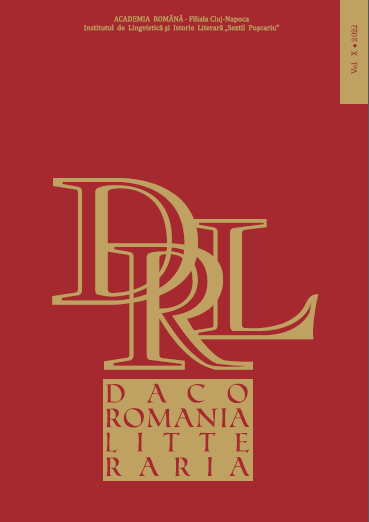Writing the Life of Servants in Early Romanian Feminist Novels
Writing the Life of Servants in Early Romanian Feminist Novels
Author(s): Anca Simina Martin, Ştefan BaghiuSubject(s): Language and Literature Studies, Studies of Literature, Theory of Literature, Sociology of Literature
Published by: Academia Română, Filiala Cluj-Napoca
Keywords: Elena Bacaloglu; feminist literature; Romanian novel; servants; Sofia Nădejde;
Summary/Abstract: Despite their potential to read as social documents on women’s condition at the turn of the century, novels written by women writers in the late nineteenth century and early twentieth century are, if not systematically overlooked, then severely understudied, at least in semiperipheral cultures, which by default have a young literary history. In this article, we explore two non-canon works, Patimi [Passions] (1903) and În luptă [In Combat] (1906–8), by Sofia Nădejde and Elena Bacaloglu respectively with a view to understanding whether they constitute glimpses into their authors’ lives and the extent to which the ideological convictions of the writers influenced how they portray the plight of female servants, who, as women and domestic workers, have a double subordinate role. In the case of both novels, there is (circumstantial) evidence to suspect that shards of the authors’ autobiographies and convictions made their way into their works, and by looking further into how Nădejde and Bacaloglu tackle the condition of women servants in Patimi and În luptă, a similar phenomenon can be observed: notwithstanding their political ethos – Nădejde espoused socialist views until her literary career started, when her views shifted toward a more conservative stance, whereas Bacaloglu contributed to the emergence of the first fascist organizations in Romania –, the two most prominent women writers of the late nineteenth century and early twentieth century instrumentalized the female servant characters to give voice to the plight of their upper-class mistresses. This, in turn, bears testimony to the fact that their works operate as artefacts of women’s condition at the turn of the century, and when corroborated with the authors’ autobiographies, they show that the first attempts at feminist literature in Romania did not put forward a progressive perspective on the social mobility of workingwomen.
Journal: Dacoromania litteraria
- Issue Year: 10/2023
- Issue No: 1
- Page Range: 103-125
- Page Count: 23
- Language: English

